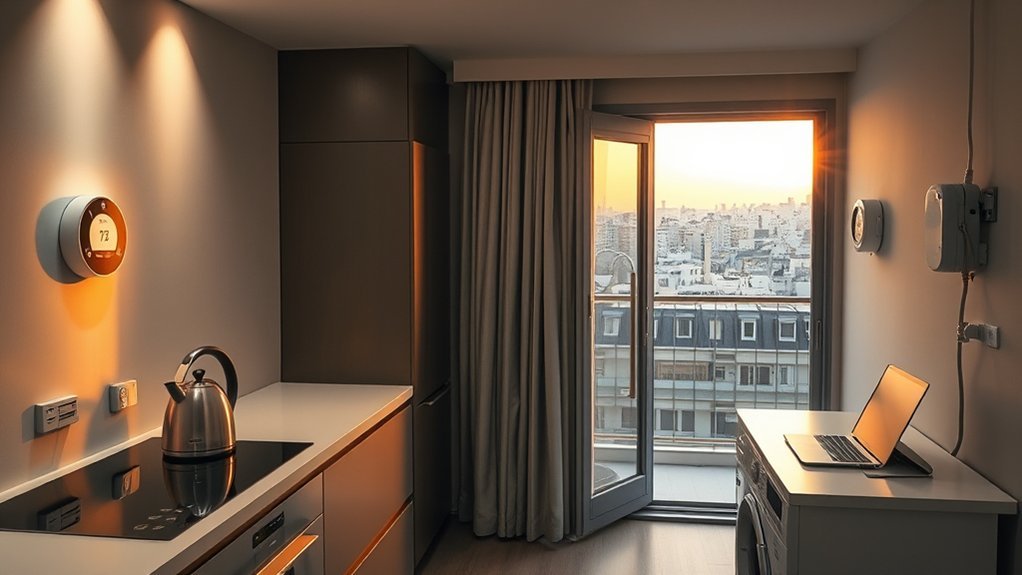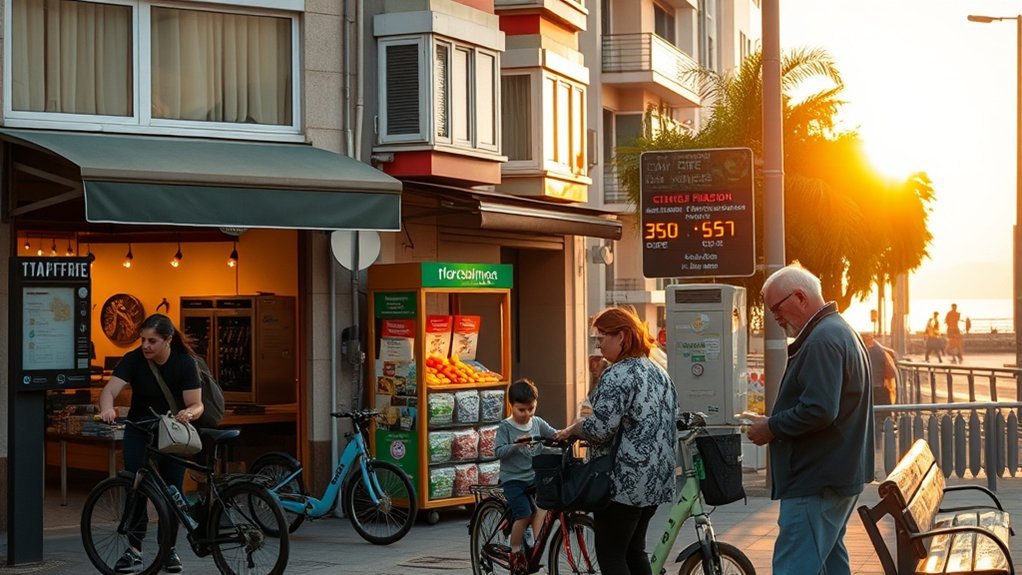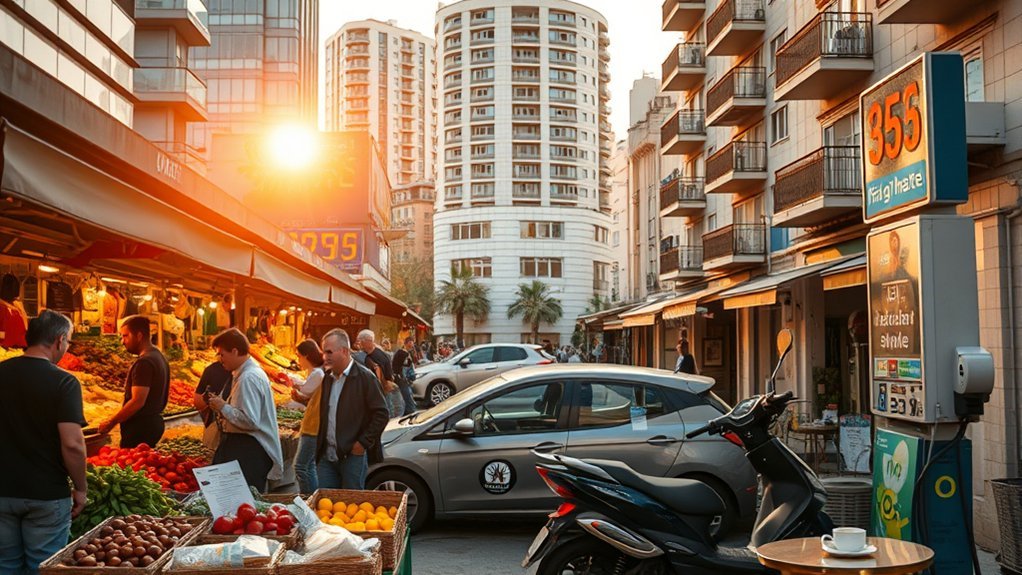You’ll typically need ₪6,500–₪13,000 monthly as a single and ₪16,000–₪30,000 for a family of four, with housing as the biggest variable: Tel Aviv rents run ₪5,500–₪8,000 in center, Jerusalem slightly less, Haifa cheaper. Utilities add ₪600–₪1,000, internet ₪100–₪150, groceries ₪1,500–₪2,500 for one or ₪4,000–₪6,000 for a family, and transport passes cost ₪200–₪300; keep reading for city-by-city breakdowns and budgeting tips.
Cost of Housing and Rent in Major Cities

Wondering how far your housing budget will go in Israel? You’ll find the cost of living for housing varies sharply by city.
Wondering how far your housing budget will stretch in Israel? Costs vary sharply by city.
In Tel Aviv renting in the center runs ₪5,500–₪8,000 ($1,450–$2,100); outside center it’s ₪4,500–₪6,500 ($1,200–$1,700).
Jerusalem’s center is ₪4,500–₪6,500 ($1,200–$1,700), dropping to ₪3,500–₪5,500 ($900–$1,500) beyond central districts.
Haifa is cheaper for renters, about ₪3,000–₪4,500 ($800–$1,200) in the center.
Buying magnifies differences: Tel Aviv commands ₪35,000–₪60,000 ($9,000–$16,000) per sqm — an 80 sqm flat costs roughly ₪2.8–₪4.8 million ($740k–$1.3M).
Jerusalem sits at ₪25,000–₪45,000 ($6,600–$12,000) per sqm, while smaller towns can be as low as ₪10,000–₪20,000 ($2,600–$5,300).
Utilities, Internet and Monthly Bills

Expect monthly utilities for a small apartment to run about ₪600–₪1,000 ($160–$260), with internet adding roughly ₪100–₪150 ($26–$40) depending on speed and provider.
Compare plans by Mbps and price—basic home packages are cheaper, while high-speed fiber costs more.
Remember costs vary by city, personal use and season, so budget for higher winter heating or summer AC bills.
Typical Monthly Utilities
Utilities are a predictable part of your monthly budget in Israel: a small apartment typically sees combined utility bills of ₪600–₪1,000 ($160–$260) and internet adds about ₪100–₪150 ($26–$40) depending on speed and provider.
For typical monthly utilities you’ll see heating, water, electricity and garbage collection included in that range; exact totals vary by city, apartment size and seasonal use.
Israel is expensive on utilities relative to some neighboring countries, especially during winter heating months and summer air-conditioning peaks.
Expect fluctuations—budget toward the high end to avoid surprises.
Combined utility and internet expenses make a noticeable portion of monthly costs, so compare providers, monitor consumption and consider energy-efficient habits to reduce bills without sacrificing comfort.
Internet Plans and Speeds
After you’ve estimated heating, water and electricity, factor internet into your monthly bills: plans typically run ₪100–₪150 ($26–$40) per month and offer speeds from about 100 Mbps up to 1 Gbps+, with fiber optic connections dominating for their higher throughput and reliability compared with DSL.
You’ll choose internet service based on speed needs, budget and whether promotional installation discounts apply; residential plans cluster in the ₪100–₪150 range while business packages cost more.
Compare latency, upload rates and contract terms rather than just headline Mbps. Some providers offer a monthly pass-style billing or bundled discounts with TV/phone.
Expect installation fees unless waived. Because fiber is widespread, you’ll often get higher sustained speeds and uptime for a similar price than with DSL alternatives.
Seasonal Cost Variations
Because consumption shifts with the seasons, your monthly bills can swing noticeably — average utility costs for a small apartment run ₪600–₪1,000 ($160–$260), while internet adds about ₪100–₪150 ($26–$40).
Expect seasonal variations: winter heating raises utility bills, summer cooling does the same in hotter areas, and consumption patterns vary by household and city.
Heating and garbage collection are often bundled into utilities, offering partial predictability, but demand-driven spikes still occur.
Compare typical monthly totals across seasons when budgeting; use the lower end for mild months and the upper end for peak winter/summer. Aim to set aside a buffer equivalent to one month’s higher-end utilities.
Regularly review providers and speeds to guarantee internet costs match your needs.
Transportation and Commuting Expenses

When you compare commuting options in Israel, public transport usually gives the best value: a monthly pass runs about ₪200–₪300 ($52–$80) depending on the city. Buses dominate intercity routes, and taxis start at roughly ₪12 ($3) plus per-kilometer charges.
You’ll find the transportation system centered on buses for most routes; intercity networks are frequent and cost-effective compared with driving. If you rely on taxis in Israel for short trips or off-hours, expect the base fare plus per-km rates to make occasional use especially pricier than a monthly pass.
Fuel costs—roughly ₪8–₪9 ($2.10–$2.40) per liter—push up the cost of owning and operating a car. Budgeting for a private vehicle means planning ₪1,500–₪2,500 ($400–$650) monthly for insurance, parking, and maintenance.
For most commuters, a monthly pass or targeted taxi use combined with occasional ride-hailing balances convenience and cost; owning a car is substantially more expensive.
Grocery and Food Prices

Expect to spend about ₪1,500–₪2,500 ($400–$650) a month if you’re single, while a family of four typically pays ₪4,000–₪6,000 ($1,000–$1,600). Grocery prices drive that budget: staples are relatively cheap, protein and produce vary more.
You’ll see milk at ₪6–₪7, bread ₪5–₪7, eggs ₪12–₪15, and chicken ₪30–₪40; fruits and vegetables often run ₪8–₪12/kg. Import taxes and seasonality cause noticeable swings, especially for produce, so your monthly bill can shift by 10–20% across seasons.
- Compare weekly markets and supermarkets; markets often beat chains on seasonal produce.
- Track promotions and bulk buys for stable items like milk and eggs.
- Expect higher costs in central cities versus periphery areas.
- Use local assortment for proteins to lower costs; imported items add premium.
- Plan menus around seasonal produce to reduce variability and total grocery prices.
If you budget proactively, you can control food spending while living in Israel.
Healthcare and Insurance Costs

After you lock in a food budget, you’ll want to account for healthcare and insurance costs, which can materially affect monthly expenses.
Israel’s public health system gives you free basic services funded by taxes, but elective procedures, shorter wait times or broader provider choice often push you to private health options. Average private health insurance runs about 70 shekels per person per month, a modest supplement that expands service access.
Overall out-of-pocket healthcare costs vary a lot depending on your needs and on whether you rely solely on public care or add private health services. Compared to countries with minimal public coverage, Israel’s model reduces baseline spending, but if you prioritize convenience or specialist access your monthly bills can rise.
For budgeting, assume basic coverage via public provision and add roughly 70 shekels per person for supplemental health insurance; increase that estimate if you expect regular private treatments or chronic-care expenses.
Education and Childcare Expenses

You’ll find public school enrollment is fundamentally free—about 50 shekels per child annually—while private schooling can add substantial tuition and fees.
Nursery care for under‑3s ranges from roughly 1,700–3,600 shekels per month, with subsidies and municipal programs sometimes lowering costs depending on location.
For higher education, government subsidies keep undergraduate tuition near 10,600 shekels and master’s around 13,800, but don’t forget extracurriculars, supplies, and optional private health services (~70 shekels/month) that raise total family expenses.
School Fees Breakdown
One clear advantage of Israeli public schooling is its affordability: state-run primary and secondary schools charge only nominal annual fees (around 50 shekels per child), while childcare and higher education costs vary widely and often require budgeting.
You’ll find school fees low in public systems, but nursery and university tuition shift expenses higher depending on choices.
- Nursery (under 3): 1,700–3,600 ILS/month, location-dependent.
- Public school fees: ~50 ILS/year per child, broadly accessible.
- Undergraduate tuition: ~10,600 ILS/year, subsidized.
- Master’s tuition: ~13,800 ILS/year; scholarships often available.
- Private child health services: ~70 ILS/month per child.
Compare childcare versus tertiary tuition when planning family budgets; subsidies and aid can materially lower costs.
Public Vs Private
Having covered how nursery and university costs can shape family budgets, it’s worth comparing public versus private options: You’ll find public education is cost-effective—mostly free with nominal fees (~50 ILS/year per child) and subsidized university tuition (≈10,600 ILS undergrad, 13,800 ILS master’s). By contrast, a private nursery for under‑3s runs 1,700–3,600 ILS/month, a clear budget pressure for working parents. Consider transportation (≈5.90 ILS per bus ride) and optional private health services (~70 ILS/month) when weighing choices.
| Option | Typical annual cost | Notes |
|---|---|---|
| Public education | ~50 ILS/year | Very low direct cost |
| Private nursery | 20,400–43,200 ILS/year | Major monthly expense |
Choose based on income, commute, and childcare needs.
Childcare and Subsidies
When weighing childcare costs in Israel, compare public options—which are largely free aside from nominal fees (~50 ILS/year per child) and subsidized university tuition (≈10,600 ILS undergrad, 13,800 ILS master’s)—against private nursery rates that range from 1,700–3,600 ILS/month (≈20,400–43,200 ILS/year) for under‑3s.
You’ll find childcare choices affect household budgets considerably: public care minimizes monthly outlay, private nurseries raise it. Government subsidies target lower net costs, varying by income and family size.
Factor in occasional extra child health services (~70 ILS/month) and the long-term savings from subsidized higher education.
- Public nursery: nominal fee, broad access
- Private nursery: 1,700–3,600 ILS/month
- University tuition: subsidized, lower than international rates
- Subsidies: income‑based reductions
- Extra health services: ~70 ILS/month
Entertainment, Leisure and Miscellaneous Spending

Although entertainment costs in Israel vary by city and venue, you can expect affordable options alongside pricier nights out: a cinema ticket runs about 40 shekels, a quick falafel and soda about 20 shekels, sit-down restaurant meals average 70 shekels, and half-liter draft beer at bars typically costs 25–30 shekels, with customary tipping of roughly 10–12% adding to dining bills.
Entertainment in Israel ranges from cheap street food and films to pricier nights out—expect 20–120 shekels per person.
You’ll find entertainment and dining choices that scale: casual outings (street food, a film) keep per-person spend low, while evenings at midrange restaurants or bars push costs toward 100–120 shekels once you include tip and a drink.
Compare cities and neighborhoods: larger cities offer more competition and occasional discounts; smaller towns may have fewer low-cost venues.
Miscellaneous leisure—museums, concerts, fitness classes—varies widely, but using loyalty programs, weekday pricing, and student/senior discounts can cut expense by 20–40%.
Plan outings with per-item prices in mind to control monthly discretionary spend.
Budget Examples for Different Lifestyles

If you prioritize essentials and public transport, you can live on roughly ₪6,500–₪9,500 per month as a single person, while someone aiming for a comfortable life should budget ₪9,500–₪13,000.
For a family of four, expect ₪16,000–₪22,000 on a tight budget versus ₪22,000–₪30,000 for comfort.
You’ll see Housing drive most of the Living Cost differences: Tel Aviv center rents alone run ₪5,500–₪8,000.
Grocery and transport scale predictably with household size and lifestyle choices.
- Single, budget: rent modest area, groceries ₪1,500–₪2,500, public transport ₪200–₪300.
- Single, comfortable: higher rent, dining out, groceries toward top of range.
- Family, budget: rent outside center, groceries ₪4,000–₪6,000, limited extras.
- Family, comfortable: larger home, childcare, more dining/travel.
Car ownership vs. monthly pass shifts Cost considerably; public transport keeps baseline lower.
Use these benchmarks to model your monthly cash flow and adjust for city, commute, and personal priorities.
Frequently Asked Questions
Can US Citizens Live in Israel?
Yes — you can live in Israel. You’ll follow visa requirements (tourist, student, work), compare residency options (Aliyah, marriage-based, temporary), and use job offers or Jewish eligibility to secure longer-term status and work rights.
How Much Is the Average Apartment Rent in Israel?
Average apartment rent in Israel depends on apartment sizes and rental prices: city-center rents run ~₪5,500–₪8,000 in Tel Aviv, ₪4,500–₪6,500 in Jerusalem, and ₪3,000–₪4,500 in Haifa; outskirts are significantly cheaper.
Where Is the Cheapest Place to Live in Israel?
You’ll find the cheapest options in Haifa, Be’er Sheva and smaller towns, where cost effective neighborhoods and affordable housing lower rent to ₪2,500–4,500; utilities and groceries are typically cheaper compared to Tel Aviv or Jerusalem.
Is Israel Expensive to Live in US Dollars?
Yes — you’ll find Israel expensive in US dollars; cost comparison shows higher living expenses than many OECD countries. Expect single-person monthly costs around $1,700–$2,500 and families $4,200–$5,800.
Conclusion
Living in Israel can be pricey in Tel Aviv and more affordable in smaller cities; rent eats the biggest slice, utilities and groceries take steady bites, and healthcare plus education add predictable chunks. You’ll spend more if you commute by car, less if you use public transit; you’ll pay premiums for international schools, save with local clinics; you’ll dine out often or cook at home. Balance choices, compare cities, track expenses, and adjust lifestyle to fit your budget.


